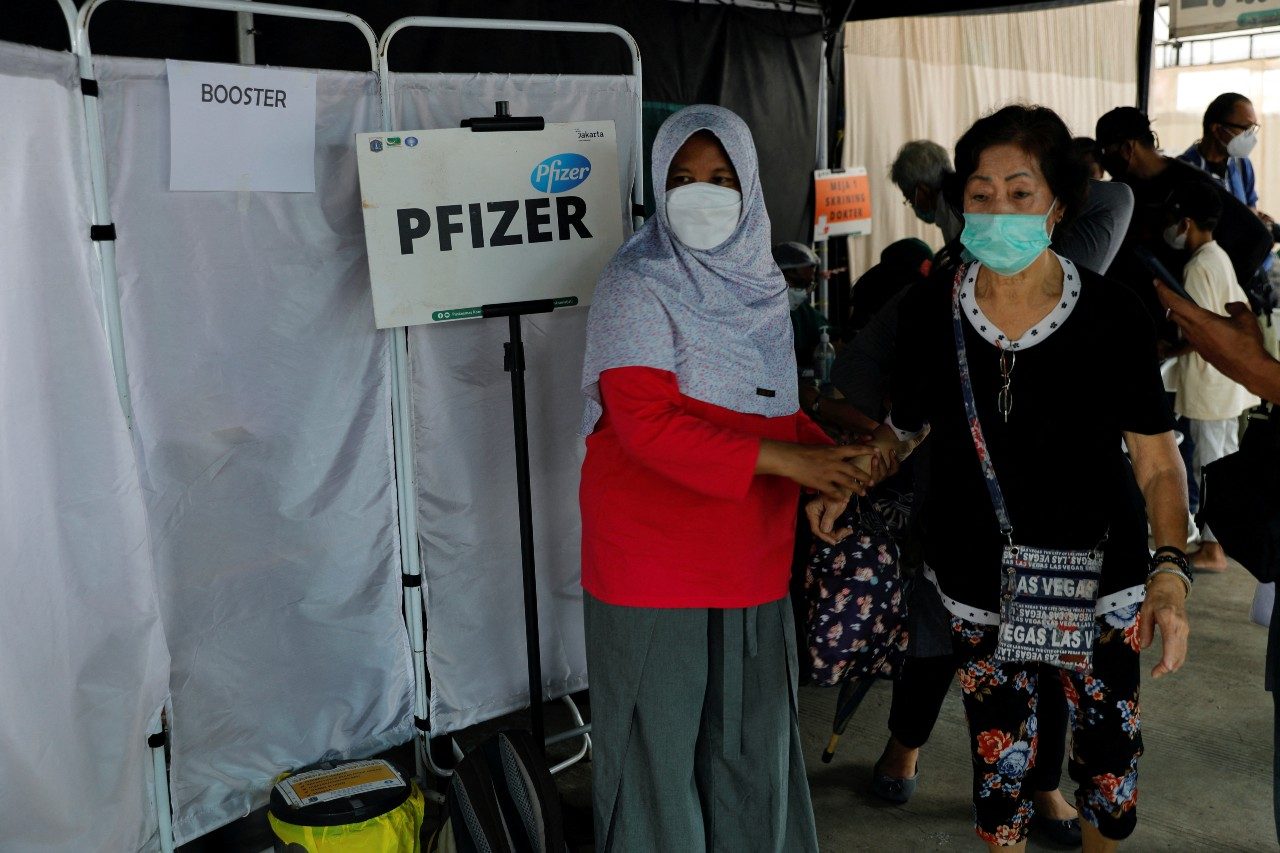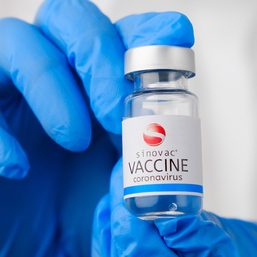SUMMARY
This is AI generated summarization, which may have errors. For context, always refer to the full article.

NORTH SUMATRA, Indonesia – Indonesia has vaccinated more than 190 million or 92% of its 208 million citizens who are required to be vaxxed. However, the total of COVID-19 cases in the country in February 2022 reached 64,000 cases, repeating the spike in July 2021 that reached 56,000 daily cases and 550,000 active cases.
The spike in cases started from June to August 2021. Data released on the government website shows that the highest number of cases occurred in July 2021, which reached 56,757 daily. The daily death rate hit 2,069 on July 27, 2021.
The death toll from COVID-19 in July 2021 reached 30,168, the highest death toll during the pandemic in the country, six months after the vaccination program began.
Vaccination delays are thought to be the cause of the spike. Since the start of the vaccination, the country has targeted one million vaccinations per day, but as Health Minister Budi Gunadi Sadikin told the press, it was not achievable initially because “the availability of vaccines is still low.”
Another factor is vaccination disinformation that triggers citizens’ doubts about vaccination.
Among those who refuse to be vaccinated is Hadi*, a young man in his 20s.
“No, I don’t want to be vaccinated,” he said, shaking his head. He did not want to explain in more detail his reasons for refusing to be vaccinated, but he believes the vaccine contains pork. He obtained this information from his family through their WhatsApp group and other Facebook posts. In Islam, pork is haram.
“I know that and many of my family also do not want to be vaccinated because they have heard that the vaccine contains pork,” he said. Though looking shy, he appeared firm when asked whether or not he wanted to be vaccinated.
Just like Hadi, his uncle who lives in one of the settlements in Medan, North Sumatra also refuses to be vaccinated. The five heads of his uncle’s neighboring families also refused the vaccine. Some claimed to have a congenital illness, some said vaccines are useless because COVID-19 is just a hoax.
In Indonesia, a country with the largest Muslim population in the world, the issue of halal and haram is very sensitive. The fatwa issued by the ulema assembly can influence public perception of vaccines.
Habibah*, a 47-year-old woman who lives in Pematangsiantar City, North Sumatra also refuses to be vaccinated. She considers the vaccine ineffective against the COVID-19 virus, and is increasingly worried because of the suspicion that it contains pork.
“The government must provide a halal alternative,” she said.
‘Anti-vaccine’ spread
Since the vaccination program was started in January 2021, the phrase “anti-vaccine” also started becoming a trending topic on social media. At the time, it was doubted the country was able to create immunity when there were still citizens who refuse the vaccine, believing it contains pork.
This issue of vaccines containing pork emerged ever since the Indonesian government started its vaccination program in January 2021 using the China-made Sinovac. To avoid citizens’ concerns, the Indonesian Ulema Council (MUI) issued a fatwa that vaccines are halal and holy so there is no need to doubt them.
For the second time, the issue of vaccines containing pork reemerged when the MUI issued a fatwa that the UK-made AstraZeneca vaccine is haram. The head of the council’s fatwa department, Asorirun Niam Sholeh, told the media that the AstraZeneca vaccine uses pork trypsin to break down proteins in its production.
“It is haram because it uses trypsin derived from pigs in its production,” Sholeh said in March 2021. The supposed use of pork enzymes (porcine trypsin) made it haram.
In its official statement last March, the MUI declared AstraZeneca illegal but said it could still be used to overcome the pandemic. But the spread of disinformation about vaccines continued on social media.
Using Facebook’s CrowdTangle tracker tool, there were 12,717 total shares of posts related to “anti-vaccine” that contained the phrases “unlawful vaccine,” “vaccine containing pork,” and other messages that mirrored a refusal to take the COVID-19 vaccination.
One of the posts using captions and photos was posted in the group and shared again by netizens up to 3,297 times. This post got a total of 5,195 interactions and up to 1,774 likes.
Visualized data on Flourish: Sum of Share ‘anti vaccine’ | Flourish
The post attached a screenshot of a national media interview with epidemiologist Dr. Tifauziah Tyassuma with a caption containing a message that the Indonesian government should not provide a vaccine that is feared to cause death and criticized the government for providing a vaccine made in Indonesia.
“The government’s job is to provide the best vaccine, contain the best education, provide the best understanding, not to threaten or punish the people. If there is one person, who is injured due to the vaccine, becomes disabled and dies from the vaccine… I want to ask the President, the Minister of Health, the National Police Chief and others, what responsibility can you give to the vaccine recipient?” said the Facebook post.
The post in the group was made on July 3, 2021, and has received a large number of responses, generally cynical about the vaccine’s effectiveness.
From the graph, it can be seen that the post was reposted repeatedly in different groups during the period July 3-9, 2021. The line graph shows that in the beginning of July 2021, anti-vaccine related posts were quite high, reaching an average of 5,000 per day.
A number of influential Facebook users have tried to dismiss accusations of illegal vaccines and the anti-vaccine movement, such as Tere Liye, Denny Siregar, and Eko Kuntadi through a video entitled, “When You Say Vaccine is Haram.”
Again, not all citizens could accept this.
Uyung, a woman who lives in Makassar, South Sulawesi, said that even though the MUI fatwa allowed the use of vaccines, which means it is not mandatory, she still doesn’t want it.
“My personal choice is no. In the sense that rejecting this decision is not sinful, and doing so is not rewarding,” she said, not wanting to publish details about her identity to protect her privacy.
She provided a long reason for her choice, saying she believes that vaccines contain animal cells that should not be introduced into the body.
“Whether we believe it or not, it is true that we are at the end of time, where things are haram and halal, good and bad are biased (unclear),” she said in Bahasa.
Disinformation has already spread
Responding to the rise of issues and disinformation related to vaccines through social media, communication expert Dr. Iskandar Zulkarnain said the Indonesian government can respond to this by providing sustainable digital literacy education to the community.
“The government must also immediately counter information on the disinformation,” said the head of the Master and Doctoral Education Program in Communication Science at the University of North Sumatra.
Zulkarnain also suggested that the government penalize or sanction those who commit disinformation. “So that it becomes a lesson for the community to be careful with receiving and distributing information,” he said.
In addition, he said that information submitted by the government to the public must be well-informed and must be clear so that it does not create misperceptions and be twisted by parties who have an agenda and ill-intent goals to influence the community.
“The government also needs to create an information service center that is easily accessible to the public for the emergence of disinformation,” he said.
At the end of 2021, the Ministry of Communication and Informatics released a statement that said there were 369 hoax information related to COVID-19 until October 2021, and labeled at least two sets of information related to COVID-19 vaccines as hoaxes.
However, again, disinformation had already spread.
In Sidodadi Village, Central Lampung, the southernmost province of Sumatra, Roni Pamungkas, 23, refused to be vaccinated.
“I wouldn’t want to be [vaccinated] even if I got the vaccine,” he said.
He said that in his village, the issue of vaccines containing pigs had become a topic of discussion among the villagers, thus influencing them not to be vaccinated. Many residents in the village, he added, refuse to be vaccinated because they think that vaccines are also ineffective in dealing with the coronavirus.
“Vaccines actually add a new virus in us,” he said.
Epidemiologist from Australia’s Griffin University, Dicky Budiman, previously feared the fatwa from the MUI would hamper the government’s vaccination program to create herd immunity.
“This is an issue that has been around for a long time but why hasn’t it been resolved until now? This is [one of] the obstacles so far regarding vaccination,” he said.
After the peak of the Delta variant in July 2021, fears of a third wave of Omicron surfaced in the latter part of that year. To prevent a spike, in December 2021, Health Minister Budi Gunadi Sadikin urged citizens to implement health protocols, surveillance or isolation, accelerate vaccination, treatment, and limit travel abroad.
However, two months later, the spike occurred amid government efforts to speed up vaccination. The peak was recorded on February 17, 2022, when the total number of confirmed COVID-19 cases reached 63,956.
According to Dicky Budiman, it would be difficult to predict when the next spike of Omicron cases would happen, that’s why mitigation measures must be taken by maintaining health protocols on top of accelerating the first and second vaccine doses plus booster shots.
“In November 2021, I predicted that we would face a third wave and the critical period would occur in February-March, and it was proven. In January, the government finally took preventive measures. The basic principle of the spreading wave is because there are a number of vulnerable populations, not necessarily many, but significant. Only 5%-10% have not been vaccinated…it is significant considering our population, it can be used as a ‘fuel’ (trigger), and even though the vaccination coverage is high, it has not yet reached the expected 90% threshold,” he said.
According to data published by the Ministry of Health, the country aims to vaccinate 208,265,720 of its citizens. As of March 2022, about 93.46% or 194,654,514 people have received the first dose of vaccine and 73.86% or 153,832,549 people have received the second dose, and only 7.8% or 16,242,588 people have received booster shots.
To prevent another spike, speeding up vaccination appears necessary. Budiman said, “The main target is two doses of 90% and a booster of at least 50%.” – Rappler.com
Names marked with [*] are not real names to protect their privacy.
Tonggo Simangunsong is an Indonesian journalist and a recipient of the #FactsFirst Fellowship.
Read the other stories by #FactsFirst fellows:
Add a comment
How does this make you feel?

![[Rappler’s Best] US does propaganda? Of course.](https://www.rappler.com/tachyon/2024/06/US-does-propaganda-Of-course-june-17-2024.jpg?resize=257%2C257&crop=236px%2C0px%2C720px%2C720px)



![[DECODED] The Philippines and Brazil have a lot in common. Online toxicity is one.](https://www.rappler.com/tachyon/2024/07/misogyny-tech-carousel-revised-decoded-july-2024.jpg?resize=257%2C257&crop_strategy=attention)












There are no comments yet. Add your comment to start the conversation.